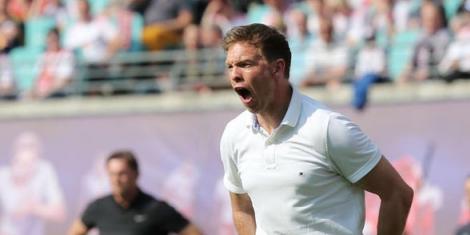
*Undated
Bayern Munich head coach, Julian Nagelsmann, says that he is not happy with Bayern’s most recent performance, despite the win against Freiburg.
Nagelsmann told his team after the match on Saturday, “We must improve our counter-pressing. We need more efficiency.” This was especially meant for the central midfielders, namely Joshua Kimmich, Leon Goretzka, and Corentin Tolisso.
Although Tolisso has been often criticized during his time at Bayern, it is not very often that Kimmich and Goretzka get called out, especially from a match where Goretzka scored a goal.
However, it appears that Nagelsmann wants more aggressiveness out of his team, independent of their goal scoring. And although the center backs didn’t look great, Nagelsmann sees the lack of Gegenpressing or counter-pressing by the midfielders as the reason for the recent defensive struggles.
Although they are top of both the Bundesliga table and their Champions League group, Nagelsmann is fully aware that mistakes like this can be punished in the Champions League knockout rounds. This attitude shows that Nagelsmann’s top goal is the Champions League. He knows that the recent Bayern coaches have been able to win the Bundesliga, but he wants to put himself on the elite list of Bayern coaches who have won a Champions League title.
Although it’s clear that the Bundesliga brought the gegenpress to life in the modern football era, it’s true that a counter-press was adopted by teams in England way back in the 1960s. It was then implemented by a spate of Dutch sides in the Eredivisie. The Dutch national side even utilized it to good effect at the 1974 World Cup. Jurgen Klopp is then celebrated for breathing new life into the gegenpress during the formative years of his managerial career.
The essence of the philosophy is not only that teams press their opponents, but that they do so with particular focus and zeal when the ball is in the opposition territory; in effect, countering the counter-attack. It requires the forward line to commit to a lot of running as they are instructed to rapidly close down opposition defenders in order to force an error when an attempt is made to play the ball out from the back.
Klopp explained: "Gegenpressing lets you win back the ball nearer to the goal. It's only one pass away from a really good opportunity. No playmaker in the world can be as good as a good gegenpressing situation, and that's why it's so important." The intense pressing game is, naturally, structured insofar as it involves the targeting of weak links in the defence - those least adept on the ball, for instance - and it involves careful calculation of risk.
So, while it is important in gegenpressing to maintain a high level of pressing throughout the game, players must be able to evaluate when to fall back into a defensive position in order to conserve energy. It simply cannot function if a team is completely exhausted or prone to injury.
Gegenpressing is most effective with a front three who are particularly quick and fit, but who are also creative enough to capitalize on errors with a decisive pass or a clinical finish. However, it is not just the forward line who play their part in the gegenpressing system. The entire team must be correctly positioned in order to support the press from the front by closing down any potential passing options for the opponent who has the ball.
Part of the thinking behind this unitary pressing is that it allows the team that presses greater options in the counter-attack which arises from the counter-press.
